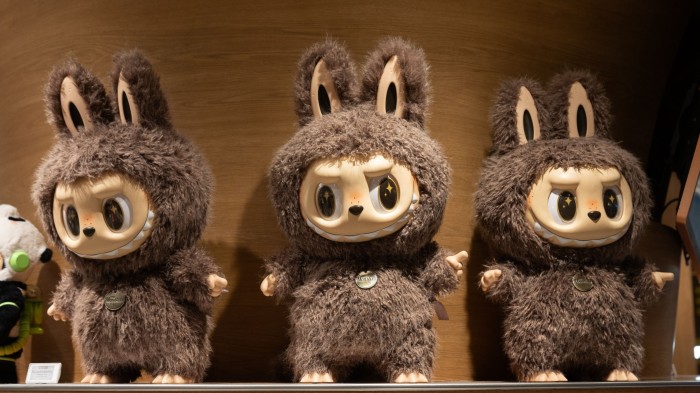A furry elf doll has turned a Chinese group into one of the world’s most valuable toy companies, triggering in-store fights, driving nearly $2bn in annual sales and signalling the rare globalisation of a Chinese consumer brand.
Labubu, an ugly-but-cute figurine sold by Beijing-based Pop Mart, has exploded in popularity over the past year. Scuffles have broken out in stores over the palm-sized plush toys, some of which go for triple their retail price in secondary markets.
They have been perennial subjects of TikTok videos and spawned mammoth queues outside Pop Mart stores from Paris to Los Angeles. Celebrities including Dua Lipa, Rihanna and Lisa of K-pop group Blackpink have sported a version of the devilishly grinning monster as a handbag accessory.
Labubu is one of the few Chinese consumer brands to gain global recognition, with Pop Mart’s market capitalisation now more than twice that of US groups Mattel and Hasbro combined.
“It’s kind of like a universal language,” said Jason Yu, greater China managing director at research group Kantar Worldpanel, referring to Labubu’s unconventional appeal. In China and elsewhere, the toys have tapped into a sense that “we don’t really need this polished cuteness, we want something which is more rebellious”.
In recent years, Pop Mart has embarked on an ambitious global expansion, with one of its executives telling the Financial Times in 2022 that the company wanted to emulate Lego in making the majority of sales in overseas markets such as the US and Europe.
At the end of last year, it had 130 bricks-and-mortar stores and 192 vending machine locations outside mainland China, mostly in the US, Europe and south-east Asia. It also markets to consumers through online platforms including Amazon and TikTok.
At the company’s flagship store in Shanghai this week, which was filled with domestic and international customers, Labubu dolls had all sold out. “It’s totally crazier than expected,” said Monica Esquivel, who was visiting from Costa Rica and hoped to pick up figurines for her three- and four-year-old nephews.
Pop Mart’s toys are usually sold in “blind boxes” that typically retail for Rmb69 ($10) in China, though stores also sell larger Labubu dolls for much more. Customers do not know which specific character in a series they have bought until after unboxing them, driving repeat purchases and a vibrant secondary market, particularly among collectors of full sets. Labubu is just one of a series of dolls that Pop Mart sells.
The company was founded in 2010 by Wang Ning, then in his twenties, from central China’s Henan province. Its 2020 Hong Kong listing and subsequent share price climb has propelled Wang’s wealth to more than $21bn, making him China’s 12th richest person and the world’s 104th, according to Bloomberg’s billionaires index.
Revenue from outside mainland China last year was Rmb5.1bn, about 39 per cent of the total. Shares have soared more than sixfold in the past year on the back of Labubu fever. Demand has reached the point that Pop Mart has had to suspend store sales twice, in London last month and in Seoul this week, because of brawls.
It has also led to soaring secondary market prices. Two teenage customers at the Shanghai store said a Rmb1,000 Labubu doll was going for close to triple the amount on secondary online platforms. Pop Mart also sells city-exclusive editions, with a Shanghai-only Mega Space Molly doll, one of Pop Mart’s other characters, retailing for Rmb1,299.
Ardent collectors have spent much higher sums to secure the rarest and most desirable editions. Last week, an enthusiast paid Rmb1.2mn, including commission, for a human-sized limited edition Labubu at an auction in Beijing.

Analysts said the “lipstick effect” — whereby consumers who would normally buy luxury items during times of economic growth spend money on less expensive discretionary goods during downturns — was supporting Pop Mart’s blistering growth.
Kantar Worldpanel’s Yu said the toys in China reflected the importance of the “emotional economy”, in which younger consumers seek comfort from products that provide a sense of companionship. “A lot of Chinese children are the product of the one-child policy over the past decades, so they really encounter a lot of loneliness,” he said.
Sales at other designer toy companies, including Guangzhou-based Miniso and Japan’s Sanrio, creator of Hello Kitty, have also grown over the past year. Miniso said this month it was considering spinning off and listing its Top Toy brand.
The explosive growth had left Pop Mart exposed to fickle consumer trends in the fiercely competitive designer toy market, said Jeff Zhang, analyst at Morningstar, adding that introducing new characters would be key to future growth.
Sales of the Monsters range, of which Labubu is a part, grew more than eightfold last year to account for about a fifth of revenue, but other collections are also growing rapidly. Sales of Pop Mart’s Crybaby line rose more than 16-fold last year to nearly a tenth of revenue.
“For 2024-25 we still see very steady growth across the globe, but over time, if [Pop Mart] fails to grow out new products, new [intellectual property] that could be attractive to its fan base, then we may see some fading,” said Zhang.


